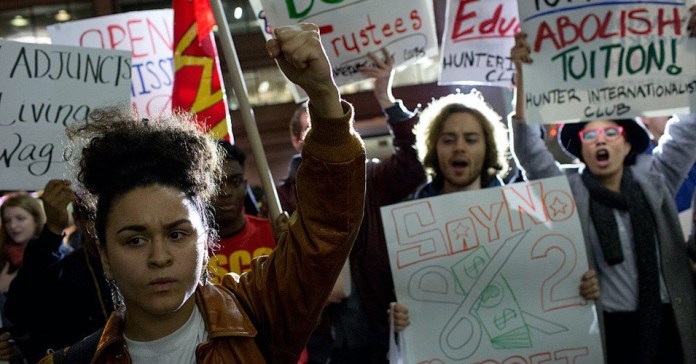The latest annual student debt report from the social science research group Jain Family Institute, published Thursday, belies claims by President Joe Biden—who earlier this week said he would not cancel $50,000 in federal student loan debt per borrower—that such a move would disproportionately benefit people who attend elite private universities.
The 2021 Student Debt and Young America report, authored by JFI’s Laura Beamer and Eduard Nilaj, begins by noting that young people are “overrun with student debt.”
“This crisis is the culmination of waning government funding for higher education, wage stagnation, wealth inequality, and a misleading emphasis on obtaining high credentials—all leading to the financial gap between college prices and later earnings,” they write.
“In 2020, aggregate balances reached $1.66 trillion in 2019 dollars, 122% higher in real dollars than in 2010,” the authors continue. “Not surprisingly, the number of borrowers, the amount they owe, and the number of loans each borrower acquires, have all increased over the time period. In 2019, 18-35 year-olds with student loan debt owed nearly $35,000 on average compared to just over $28,000… in 2009. Back in 2009 there were only 32 million federal borrowers; in 2019, that number swelled to 43 million.”
My wonderful @jainfamilyinst colleagues @laura_bmw & @Edi_Nilaj have released their new report “Student Debt and Young America,” which pretty comprehensively demolishes many of the myths about who does and doesn’t have student debt.https://t.co/y02KFosRQ3
Highlights to follow
/1 https://t.co/UImAMCiRh0— Marshall Steinbaum 🔥 (@Econ_Marshall) February 18, 2021
The study notes marked racial disparities in student debt, with Black people suffering both the largest increase over time and the highest median amount owed in 2019, at $20,236. Asian students experienced the worst debt inequality in 2019. Although their median debt was $18,548 that year, their average debt balance was $38,860.
Critically, the study finds:
Because low- and lower-middle income communities see the worst debt-to-income ratios, they would see the largest portion of their income freed up through student debt forgiveness. Young adult borrowers in low- and lower-middle income communities would receive an outsized share of forgiveness in aggregate dollars compared to middle- and upper-income communities.
This flies in the face of the implications of Biden’s remarks at a CNN town hall Tuesday evening in Milwaukee, where the president said he doesn’t want to forgive “billions of dollars of debt for people who have gone to Harvard and Yale and Penn” instead of using “that money to provide money for early education for young children who… come from disadvantaged circumstances.”
Rep. Alexandria Ocasio-Cortez (D-N.Y.), an outspoken proponent of student debt forgiveness, rebutted Biden’s assertion by asking “who cares what school someone went to?”
“Entire generations of working-class kids were encouraged to go into more debt under the guise of elitism. This is wrong,” Ocasio-Cortez tweeted late Tuesday. “The case against student loan forgiveness is looking shakier by the day… We can and should do it. Keep pushing!”
Speaking of the freshly published JFI study, Beamer on Thursday tweeted that she was “waiting until this report came out to address the ridiculous ‘Harvard, Yale, and Penn’ comment” from Biden, calling it “a myth” that borrowers attending elite schools “would overwhelmingly benefit from forgiveness compared to their peers elsewhere.”
Been waiting until this report came out to address the ridiculous “Harvard, Yale, and Penn” comment made by @potus yesterday- a myth that these borrowers would overwhelmingly benefit from forgiveness compared to their peers elsewhere. A thread on forgiveness impacts 1/x https://t.co/NV4OaOJcwn
— Laura Beamer (@laura_bmw) February 18, 2021
Other progressive politicians and advocates also pushed back on Biden’s remarks. Rep. Ayanna Pressley (D-Mass.) affirmed that the president could cancel student debt “with the stroke of a pen.” Americans for Financial Reform, which has led demands for Biden to cancel $50,000 of student debt per borrower through executive action, on Wednesday decried Biden’s proposed $10,000 per person debt relief as inadequate.
“Far more than $10,000 in cancellation is required,” the group said, “to provide aid that 44 million families and the economy need.”
Related posts:
Views: 0
 RSS Feed
RSS Feed















 February 20th, 2021
February 20th, 2021  Awake Goy
Awake Goy 

 Posted in
Posted in  Tags:
Tags: 
















